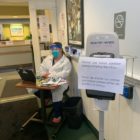Disparities
More Women Than Men Put Off Medical Appointments Due To Pandemic, Survey Finds
|
Like many women throughout Connecticut, Isabella Vasquez of New Britain has missed or postponed health care appointments due to the pandemic. For the 23-year-old house cleaner, postponing medical appointments became necessary when the COVID-19 crisis affected childcare for her 2-year-old son. “I would have to not go to my appointments sometimes because I didn’t have childcare,” she said. “When COVID struck, that’s when daycare became less reliable.” If her son sneezed or had a runny nose, daycare would not accept him, Vasquez explained. More women than men have either missed medical appointments or postponed the care they thought they needed during the height of the pandemic, according to a recent DataHaven survey released in October of more than 5,000 randomly selected state residents.





